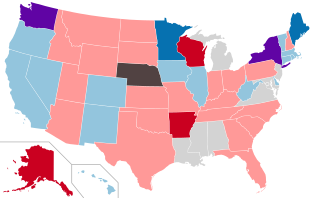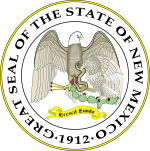
The Ohio Republican Party is the Ohio affiliate of the Republican Party. It was founded in Columbus, Ohio, in 1854.

James Allan Barcia is an American Democratic politician from Michigan. He has served successively in the Michigan House of Representatives, the Michigan Senate, the United States House of Representatives and then again the Michigan Senate, from which he was term-limited in January 2011. He has served as County Executive of Bay County, Michigan, since January, 2017.

The 1980 United States House of Representatives elections was an election for the United States House of Representatives on November 4, 1980, to elect members to serve in the 97th United States Congress. They coincided with the election of Ronald Reagan as president, defeating Democratic incumbent Jimmy Carter. Reagan's victory also allowed many Republican House candidates to secure elections. The Republicans gained a net of 35 seats from the Democratic Party. The Democrats nonetheless retained a significant majority, unlike the Senate elections, where Republicans gained control of the chamber. However, many Democratic congressmen from the south frequently took conservative stances on issues, allowing Republicans to have a working ideological majority for some of President Reagan's proposals during his first two years in office.

The 1974 United States House of Representatives elections were elections for the United States House of Representatives on November 5, 1974, to elect members to serve in the 94th United States Congress. They occurred in the wake of the Watergate scandal, which had forced President Richard Nixon to resign in favor of Gerald Ford. This scandal, along with high inflation, allowed the Democrats to make large gains in the midterm elections, taking 48 seats from the Republicans, and increasing their majority above the two-thirds mark. Altogether, there were 93 freshmen representatives in the 94th Congress when it convened on January 3, 1975. Those elected to office that year later came to be known collectively as "Watergate Babies." The gain of 49 Democratic seats was the largest pickup by the party since 1958. Only four Democratic incumbents lost their seats.

The 1970 United States House of Representatives elections was an election for the United States House of Representatives held on November 3, 1970, to elect members to serve in the 92nd United States Congress. They occurred in the middle of Richard M. Nixon's first term as president. His party, the Republican Party, lost a net of 12 seats to the Democratic Party, which thereby increased its majority in the House. Many viewed the results of the 1970 election as an indication of public fatigue over the ongoing Vietnam War as well as the fallout from the Kent State Massacre.

The 1960 United States House of Representatives elections was an election for the United States House of Representatives on November 8, 1960, to elect members to serve in the 87th United States Congress. They coincided with the election of President John F. Kennedy and was the first house election to feature all 50 current U.S. states.
An appointed officer of the United States House of Representatives from 1789 until 1995, the doorkeeper of the United States House of Representatives was chosen by a resolution at the opening of each United States Congress. The Office of the Doorkeeper was based on precedent from the Continental Congresses. Without debate, the first federal Congress created the doorkeeper's position by resolution on April 2, 1789. The doorkeeper controlled access to the House chamber and eventually oversaw the press in the gallery.
Tennessee's 9th congressional district is a congressional district in West Tennessee. It has been represented by Democrat Steve Cohen since 2007.
New York’s 27th congressional district was a congressional district for the United States House of Representatives in western New York. It included all of Orleans, Genesee, Wyoming, and Livingston counties and parts of Erie, Monroe, Niagara, and Ontario counties. The district contained most of the eastern and southern suburbs of Buffalo, most of the southern suburbs of Rochester, as well as large rural areas to the east and south. The seat was last occupied by Republican Chris Jacobs, who won a special election on June 23, 2020. Previously, it had been vacant from October 1, 2019, when Republican incumbent Chris Collins resigned after pleading guilty to charges of insider trading.

James David Santini was an American attorney, politician and lobbyist who served as the U.S. representative for Nevada's at-large congressional district from 1975 to 1983. He was a member of the Democratic Party until 1986, when he joined the Republican Party.

The 1974 United States House of Representatives elections in South Carolina were held on November 5, 1974, to select six Representatives for two-year terms from the state of South Carolina. The primary elections were held on July 16 and the runoff elections were held two weeks later on July 30. Three incumbents were re-elected, Democrat John Jenrette defeated incumbent Republican Edward Lunn Young in the 6th district and the two open seats in the 3rd and 5th districts were retained by the Democrats. The composition of the state delegation after the elections was five Democrats and one Republican.

The 2018 United States House of Representatives elections in Rhode Island were held on November 6, 2018, to elect the two U.S. representatives from the state of Rhode Island, one from each of the state's 2 congressional districts. The election coincided with the 2018 U.S. mid-term elections, as well as other elections to the House of Representatives, elections to the United States Senate and various state and local elections. The primaries took place on September 12.

The 2020 United States state legislative elections were held on November 3, 2020, for 86 state legislative chambers in 44 states. Across the fifty states, approximately 65 percent of all upper house seats and 85 percent of all lower house seats were up for election. Nine legislative chambers in the five permanently-inhabited U.S. territories and the federal district of Washington, D.C. also held elections. The elections took place concurrently with several other federal, state, and local elections, including the presidential election, U.S. Senate elections, U.S. House elections, and gubernatorial elections.

The 2018 United States state legislative elections were held on November 6, 2018, for 87 state legislative chambers in 46 states. Across the fifty states, approximately 56 percent of all upper house seats and 92 percent of all lower house seats were up for election. Additionally, six territorial chambers in four territories and the District of Columbia were up as well.

The 2015 United States state legislative elections were held on November 3, 2015. Seven legislative chambers in four states held regularly scheduled elections. These off-year elections coincided with other state and local elections, including gubernatorial elections in three states.

The 2011 United States state legislative elections were held on November 8, 2011. Eight legislative chambers in four states held regularly scheduled elections. These off-year elections coincided with other state and local elections, including gubernatorial elections in four states.

The 2016 United States state legislative elections were held on November 8, 2016, for 86 state legislative chambers in 44 states. Across the fifty states, approximately 65 percent of all upper house seats and 85 percent of all lower house seats were up for election. Nine legislative chambers in the five permanently-inhabited U.S. territories and the federal district of Washington, D.C. also held elections. The elections took place concurrently with several other federal, state, and local elections, including the presidential election, U.S. Senate elections, U.S. House elections, and gubernatorial elections.

The 2012 United States state legislative elections were held on November 6, 2012, for 86 state legislative chambers in 44 states. Across the fifty states, approximately 65 percent of all upper house seats and 85 percent of all lower house seats were up for election. Nine legislative chambers in the five permanently-inhabited U.S. territories and the federal district of Washington, D.C. also held elections. The elections took place concurrently with several other federal, state, and local elections, including the presidential election, U.S. Senate elections, U.S. House elections, and gubernatorial elections.
















